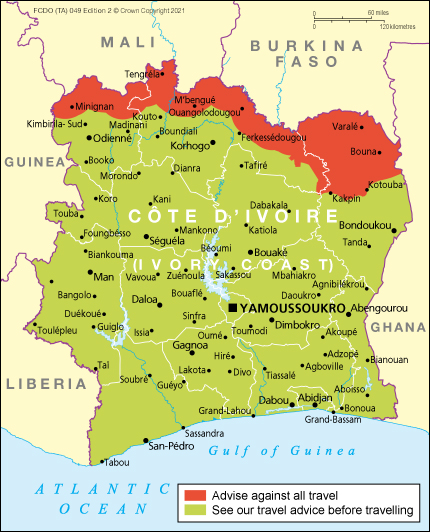Côte d'Ivoire
Summary

The Foreign, Commonwealth & Development Office (FCDO) advises against all travel to:
- Within 40km of the borders with Mali and Burkina Faso
- Northern Zanzan and Savenes provinces
- Comoé national park
See Local travel and Terrorism
COVID-19 entry restrictions for Côte d’Ivoire
Before you travel, check the ‘Entry requirements’ section for Côte d’Ivoire’s current entry restrictions and requirements. These may change with little warning. Monitor this advice for the latest updates and stay in contact with your travel provider.
Travelling from and returning to the UK
Check what you must do to travel abroad and return to England, Scotland, Wales or Northern Ireland.
If you plan to pass through another country to return to the UK, check the travel advice for the country you’re transiting. If you will pass through a red list country, book your hotel quarantine package before travelling to the UK.
If you’re planning travel to Côte d’Ivoire, find out what you need to know about coronavirus there in the Coronavirus section.
During the COVID-19 pandemic, it is more important than ever to get travel insurance and check it provides sufficient cover. See the FCDO’s guidance on foreign travel insurance.
For information about COVID-19 vaccines, see the Coronavirus page.
Protests and demonstrations in the country are likely to occur. You should exercise caution and avoid all demonstrations, large crowds, political gatherings and rallies. See Safety and security
Terrorists are likely to try to carry out attacks in Côte d’Ivoire. There is an increased risk of terrorism and kidnap in northern border areas, due to the porous nature of borders into the Sahel region. However, there remains a risk elsewhere in the country. Attacks on beach resorts, hotels, cafés and restaurants visited by foreigners are possible and could occur without warning. Be especially vigilant in these places. See Terrorism
You will need to get a visa before you travel. See Visas
Violent crime can occur at any time. Be particularly vigilant and take care when travelling by road, especially at night. See Crime
UK health authorities have classified Côte d’Ivoire as having a risk of Zika virus transmission. For information and advice about the risks associated with Zika virus, visit the National Travel Health Network and Centre website.
The British Embassy in Abidjan can provide emergency consular assistance. Consular support is not available in parts of Côte d’Ivoire where the FCDO advises against all but essential travel.
The Overseas Business Risk service offers information and advice for British companies operating overseas on how to manage political, economic, and business security-related risks.